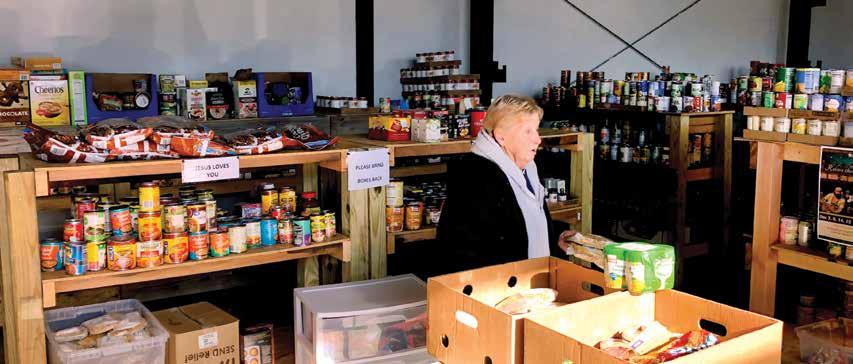
3 minute read
A Common Bond
For about two years, a group of pastors has been meeting together for the purpose of mutual edification. The group was initiated by Peter Hess, founding pastor of Christ Fellowship Church of Williamsburg. He first had the idea for this gathering after listening to a Pastors’ Talk: 9Marks podcast on pastoral friendship. Hess recounts, “Mark Dever shared how they do a monthly pastors gathering in the DC area at Capitol Hill Baptist Church. I thought we might be able to do the same here in Hampton Roads. So, I emailed some brother pastors I knew, and we got together for lunch to discuss the idea.”
What started with a handful of pastors has now grown to a group that, at times, reaches 20. Each monthly meeting includes a roundtable discussion in which every pastor shares one item he wants to discuss. Hopson Boutot, the pastor of Poquoson Baptist Church, was among the original handful of pastors at the beginning. He recalls, “Peter would moderate the discussion through as many of the items that we could cover in 90 minutes.”
Boutot continues, “As our group grew, we began noticing that the meetings were not as profitable as before. Moderating roundtable discussion topics was becoming more challenging as the topics became less focused and less applicable to everyone attending.” Boutot, Hess, and Miguel Davilla, pastor of Hampton Roads Fellowship, decided to provide more structure to the meetings by providing topics in advance. Now they gather monthly and discuss an article related to one of the 9Marks of a healthy church. They take turns finding the articles and moderating the discussion.
When asked about the objective of the pastors' lunches, Hess replied, “Pastors are often very lonely and feel like they can’t unburden themselves to others in the church because of how they might be perceived (e.g. ungrateful, unspiritual). Given that pastors bear unique spiritual stresses and temptations, it is important for pastors to have pastor-friends, who understand and care. We are hoping to build those kinds of relationships in the group as well as help one another with ministry ideas.”
The common bond shared by group participants is their loose association with affirmations and denials as authored by Together for the Gospels. Hess shared, “We don’t want these meetings to devolve into arguments about particular theological positions. Instead, we want to encourage each other to think Biblically and wisely about the way we shepherd our churches and care for our own souls.”
Speaking of the personal value gleaned from participating in the group, Boutot said, “I’ve been a part of several pastors’ networks in the past, and this, by far, has been the most valuable. I appreciate the friendships that have developed. Many of us pray for one another regularly. Some of us meet outside of the big group in order to continue to grow together. Several of the men in the group have preached in my church and were highly instrumental in helping me wisely lead my church towards greater faithfulness to Scripture.”
Regional Catalyst and Church Planting Strategists in the SBC of Virginia provide many opportunities for networking and fellowship in each region throughout the year. But one component of our strategy is to see more peer initiated and peer led groups meeting regularly just like the one initiated by Hess. ■
Advice For Starting a Pastors’ Group
When asked what advice they would give to fellow pastors wanting to start their own pastors’ group, Hess and Boutot offered these four tips:
1. Require Unity
It’ll be hard to cultivate this type of gathering if you don’t agree on the essentials. The goal of the group is to build each other up, not argue.
2. Encourage Diversity
As important as it is to be like-minded, it’s also important to have some level of diversity in your group. In God’s providence, our group includes young and old, all races, planters and revitalizers, full-time pastors, and bi-vocational ministers.
3. Just Start Somewhere
Start with two or three pastors in your area and see what God can do!
4. Pray
“With men this is impossible, but with God all things are possible.” Matthew 19:26 (HCSB)
RESOURCE: If you would like help in starting your own pastors’ group, contact your regional SBC of Virginia catalyst or church planting strategist, visit: sbcv.org










